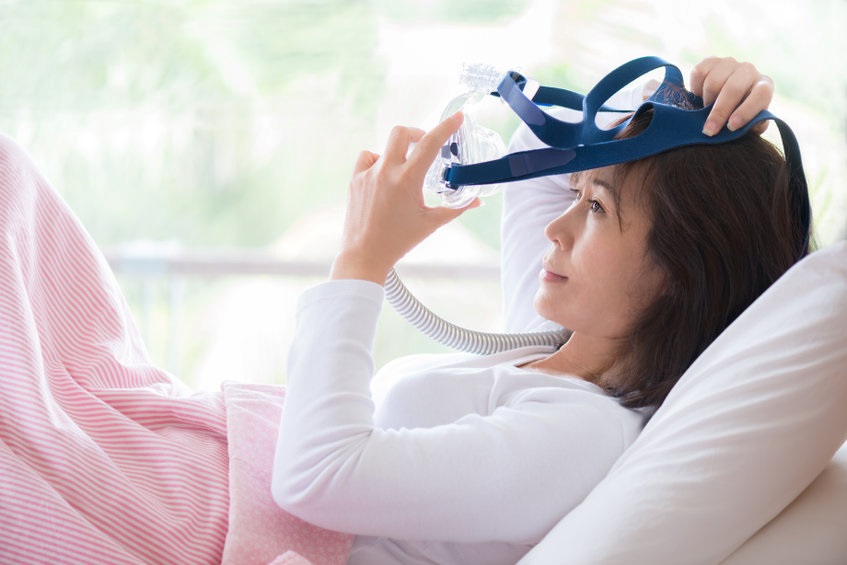How to Combat CPAP Side Effects
If you have sleep apnea, CPAP therapy is most likely your best bet for reducing your symptoms. To prevent bigger problems — like high blood pressure, stroke, and heart issues — you need to consistently use your CPAP. However, the side effects of using a CPAP can make regular compliance difficult.
Below, we’ve listed some of the most common CPAP side effects and possible prevention measures:
1. Air Leakage.
This is one of the most widely reported CPAP side effects. If your CPAP is not cleaned adequately or is not the best fit for you, air may escape from your mask, particularly if you frequently change sleeping positions. An air leakage will not only prevent air pressure from reaching the level you set, but it can create extra noise that’ll bother your bed partner.
Solutions — Making sure to clean your mask regularly or adjusting the pads and straps of your mask for the perfect fit are two easy solutions. If these efforts don’t work, ask your doctor about a pressure adjustment or a different size or style of mask.
2. Dry Nose & Mouth.
Because your CPAP consistently pushes air into your nose (and possibly your mouth), you may experience extra dryness in your airways. This dryness may even cause nosebleeds.
Solutions — To treat your dry nose, try a heated humidifier, heated tubing, or an over-the-counter nasal saline spray. To prevent your mouth from opening at night, consider a full-face mask or chinstrap.
3. Skin Irritations
Skin rashes and pressure sores can develop if your CPAP mask consistently sits too snug against your face. You may even have a sensitivity to the mask material.
Solutions — First, try loosening your mask or finding a better-fitting mask. You may also try placing barrier creams and liners between the mask and your skin.
4. Difficulty Exhaling.
Though your CPAP makes it easier for you to breathe in, you may struggle to breathe out against the air pressure. This may resolve over time as you get used to it, but the effort required to exhale may keep you awake at night.
Solutions — Your CPAP machine may have a feature that will “ramp” up from a lower initial air pressure, which can make it easier for you to breathe out. You may need to ask your doctor about reducing your pressure level. If neither of these options work, your doctor may suggest a BiPAP device that will create more air pressure when you inhale and less when you exhale.
5. Aerophagia.
When your CPAP pressure is too high, excess air can flow into your stomach through your esophagus and you may experience a sensation of eating or swallowing air. This condition can cause excess gas and bloating.
Solutions — First, simply try decreasing the air pressure. Other prevention measures include sleeping wedge pillows, medication for heartburn or gastroesophageal reflux disease, or BiPAP. Be sure to ask your doctor about these options.
6. Claustrophobia.
Some people may struggle with the tightness of the mask on their face. Claustrophobia can be even more challenging for those using full-face masks that cover their nose and mouth.
Solutions — This problem may fade away over time as you get used to the mask. If your claustrophobia persists, speak to your doctor about claustrophobia medication or try relaxation exercises to reduce your CPAP-related anxiety.
7. Insomnia.
Insomnia is a common issue for many CPAP users. Whether you have trouble with the bulky, constructive nature of your mask or the noises your machine makes, your CPAP can make it difficult to sleep.
Solutions — To maximize comfortability at night, investigate other mask style options or practice wearing your CPAP while you are awake so you can get used to it. Ear plugs may be your best bet for combating CPAP noises.
8. Infections.
If your CPAP is not cleaned properly and routinely, you can develop sinus and lung infections.
Solutions — The best solution is to thoroughly clean your CPAP. To avoid bacteria or fungi development, wash your CPAP equipment daily with water and mild soap. Occasionally, soak the equipment in a mixture of 1 part vinegar and 3 parts water.
Looking for CPAP supplies, masks, and machinery? Home Medical Equipment Locations offers a reliable way to purchase the quality equipment you need.

